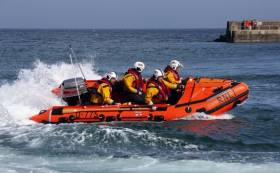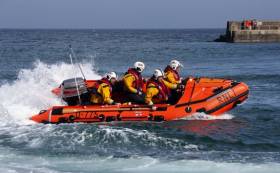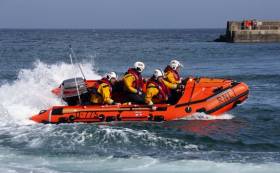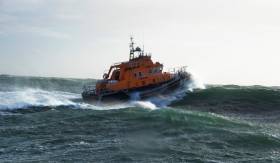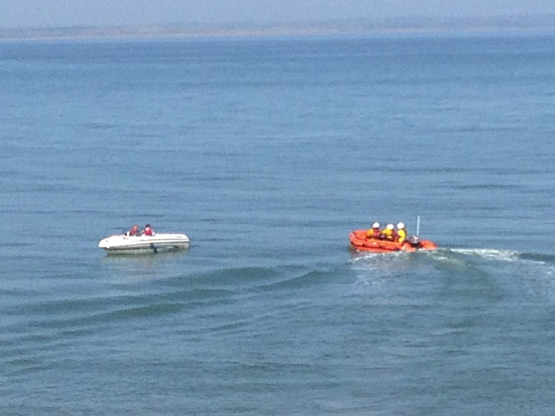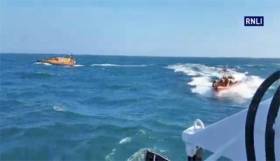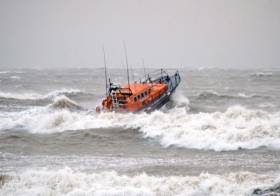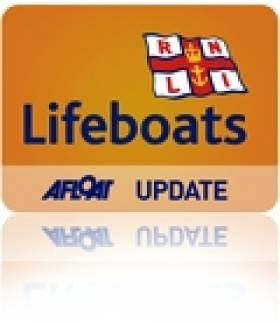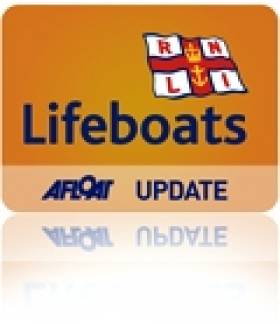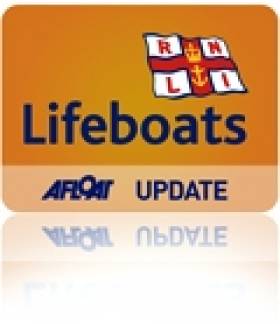Displaying items by tag: Newcastle
Newcastle Lifeboat Rescues Man Clinging To Kayak
#RNLI - Newcastle RNLI was requested by Belfast Coastgaurd to launch to the aid of what was believed to be a dinghy in trouble a half-mile south of Newcastle Harbour on Saturday afternoon (31 December).
However, when the inshore lifeboat arrived on scene, the crew discovered that the callout was to three kayakers in trouble, with one man found clinging to his kayak in the freezing water and unable to get to safety.
The lifeboat volunteers observed one kayak being towed by another but only one person was visible. On further investigation it was established there was one person in the water further along the shoreline.
Proceeding further south, the lifeboat crew located a male clinging to the front of his kayak, unable to get to safety.
The person was recovered from the freezing water onto the lifeboat and the crew carried out the RNLI’s ‘casualty care’ before returning to Newcastle Lifeboat Station to await the arrival of the Northern Ireland Ambulance Service.
The lifeboat then went back to the scene to rescue a further kayaker and his kayak while Newcastle Coastguard recovered the third casualty from the shore line. The casualties were transferred into the care of paramedics.
“Another five minutes and we could have been dealing with a completely different outcome,” said Newcastle RNLI lifeboat helm Alan Jones. “The water is absolutely freezing at this time of year.”
Newcastle Lifeboat Launches To Drifting Cruiser
#RNLI - Newcastle RNLI's inshore lifeboat Eliza was requested to launch by Belfast Coastguard just before 2pm on Saturday afternoon (17 September) to investigate a vessel adrift four miles east of Newcastle in Co Down, near the mouth of Dundrum Bar.
The lifeboat was launched within minutes and made best speed to the casualty's position in calm seas. Once close enough, it was established that the cruiser had one person on board and had no means of contacting emergency services due to power failure.
A tow was quickly connected between the lifeboat and the casualty vessel and it was brought into and secured on its mooring at Dundrum Harbour. Both lifeboat and crew were back on station by 3.30pm.
Newcastle Lifeboat Launches In Leisure Craft Breakdown
#RNLI - Newcastle RNLI brought two people to safety on Wednesday evening (1 June) after they got into difficulty off the Dundrum coast in Co Down.
The volunteer lifeboat crew was alerted shortly before 8pm following a request by Belfast Coastguard that a vessel with two onboard had broken down in Dundrum Bay.
The inshore lifeboat, helmed by Niall McMurray with crew members Declan Barry and Karl Rooney onboard, launched within minutes to the incident. Weather conditions at the time were described as good with a flat, calm sea.
Once on scene, the lifeboat crew observed that the 17ft leisure craft had experienced engine failure. The crew checked that the two on board were safe and well before establishing a tow line and proceeding to bring the vessel safely back to Dundrum.
Speaking following the callout, McMurray said: "Thankfully both people were not injured and we were able to help bring them safely back to shore.
"We would encourage anyone planning to go in or near water especially during this hot weather spell to enjoy themselves but to always respect the water.
"Check your boat and equipment before every trip, carry a means of communication should you get into any difficulty and always wear a lifejacket."
#RNLI - Rosslare Harbour RNLI volunteers launched their all-weather lifeboat at 7.30am yesterday morning (Sunday 8 May) to answer a call from the Irish Coast Guard to assist a local fishing boat with engine problems.
A very dense fog was down but the skill of the lifeboat navigators and crew ensured a quick location of the vessel, which was a short distance from Rosslare Burrow point off the Wexford coast.
"With a visibility of less than 200 metres, the lifeboat crew did extremely well to locate the vessel so quickly," said Rosslare Harbour RNLI volunteer lifeboat press officer Jamie Ryan.
"This type of weather can come in fast and can be extremely challenging when a vessel suffers engine problems. Thankfully it was a successful callout."
Hours later, Newcastle RNLI launched to assist an adult and child safely back to shore just off Newcastle Harbour in Co Down.
Three volunteer lifeboat crew launched the inshore lifeboat to assist a leisure craft which experienced engine failure. Once on scene, the crew established a tow and proceeded to Newcastle Harbour.
Newcastle RNLI Helm Niall McMurray said: "We’re always happy to help where we can and thankfully conditions were calm with no one injured."
Kilkeel Lifeboat Aids Fishing Vessel Rapidly Taking On Water
#RNLI - Kilkeel RNLI's volunteer lifeboat crew launched at 9.20am yesterday morning (Monday 14 March) to go the aid of a fishing vessel rapidly taking in water about 25 miles southeast of Kilkeel, Co Down.
The vessel was in a heavy swell when water was seen in the fish room. The boat’s pump was unable to cope with the water entering and at one stage the fish room was three-quarters full of water. It had begun to affect the stability of the boat when the alarm was raised and help was dispatched.
When Kilkeel RNLI arrived on scene, the lifeboat was carefully manoeuvred by its volunteer crew alongside the vessel in an increasingly heavy swell, and two of the lifeboat crew went aboard the fishing vessel with a salvage pump. Newcastle RNLI’s all-weather lifeboat was also on scene to render assistance.
The Kilkeel lifeboat then transferred a further pump from the Newcastle lifeboat, and with all the pumps working the boat was kept afloat. The two lifeboats then escorted the fishing boat under her own steam safely into Kilkeel Harbour, arriving at about 12.45pm.
John Fisher, Kilkeel RNLI lifeboat operations manager, said: "If the incident had happened further out to sea then the operation would have been more difficult, but with the Kilkeel and Newcastle lifeboats co-operating well together, the fishing boat and its crew were brought safely ashore.
Kilkeel RNLI's volunteer lifeboat crew on this callout were Raymond Newell, Alan Henning, Andrew McConnell and Wayne Marshall.
Newcastle RNLI Searches After Flare Sighting In Third Callout This Week
#RNLI - Newcastle RNLI had their third call of the week last night (Thursday 18 February) with volunteers involved in a three-hour search operation after flares were sighted off the Co Down coast.
Newly appointed coxswain Alan Jones had the opportunity to put his RNLI training and skills to good use launching the lifeboat on service for a second time this week when the volunteer crew was requested at 7.30pm after flares were sighted from St John’s Point, in the Dundrum Bay area off Annalong.
The station’s all-weather lifeboat, which only an hour earlier had returned from passage after routine repairs, launched with six crew members on board. Weather conditions were described as good with a light swell and little wind as the lifeboat made its way in the dark but clear night.
Once on scene some eight miles from the lifeboat station and three miles off Annalong, the crew conducted an intensive search for three hours. Nothing untoward was found and the lifeboat was stood down at 10pm.
Earlier this week, Newcastle RNLI were requested to launch their all-weather lifeboat at 5.52am on Tuesday 16 February to assist injured crew member on a 70ft fishing vessel 18 miles south-west of the Isle of Man and 25 miles south-east of Newcastle.
On the first callout for coxswain Alan Jones, the lifeboat launched at 6.05am. Weather conditions at the time were described as gusty with southerly Force 6 winds blowing and rough seas.
The casualty was airlifted by the Irish Coast Guard helicopter Rescue 116 from Dublin, as previously reported on Afloat.ie.
The crew were also in action on Saturday evening (13 February) when they rescued four people after a 36ft angling boat suffered engine failure eight miles south east of St John’s Point.
Speaking following what has been a busy period for the station, Jones said: "Our volunteer lifeboat and shore crew responded with great enthusiasm to all three call outs this week, one of which was in the early hours of the morning.
"They all volunteer to save lives at sea and are prepared to drop what they are doing to help anyone who may be in difficulty in the water.
"We would always encourage anyone who finds themselves in trouble or thinks someone maybe in difficulty to raise the alarm. We would always rather launch and find nothing untoward than not launch at all."
Newcastle Lifeboat Rescues Four After Angling Boat Gets Into Difficulty
#RNLI - Newcastle RNLI rescued four people on Saturday night (13 February) after their angling boat got into difficulty off the Co Down coast.
The volunteer crew were requested to launch their all-weather lifeboat at 7.30pm on Saturday following a request from Belfast Coastguard to go to the aid of a 36ft angling boat, which had suffered engine failure eight miles south east of St John’s Point while on passage from Howth to Carrickfergus.
Under coxswain Aidan Riley and with five crew members on board, the lifeboat launched within minutes and made its way to the scene some 16 nautical miles from the station.
Weather conditions at the time were described as fresh with rough seas and Force 5-6 winds blowing.
With the vessel losing battery power, Newcastle RNLI advised the crew to switch the boat’s lights off until the lifeboat was closer to their location.
Once on scene 80 minutes later, the lifeboat crew assessed the situation and once confident that no one was in any immediate danger, the lifeboat crew began to work with the angling crew to set up a towline.
The vessel was then taken under tow and brought safely back to Ardglass.
Speaking following the callout, Newcastle RNLI coxswain Aidan Riley said: "The vessel was quite a bit away from the shore when it sustained engine difficulties and the crew made the right call to ask for assistance.
"We were delighted to help and glad to see the boat and her crew returned safely to Ardglass."
#rnli – Two long-serving Newcastle RNLI volunteers have received awards from the charity for their tireless work and dedication to saving lives at sea. Deputy Launching Authority Joe McClelland and All Weather lifeboat crewmember William Wilson were presented with the awards at the station recently and the honour was well received among their colleagues at the lifeboat station. Between them the two men have given almost seventy years' service to the RNLI and neither of them have any plans to retire.
Joe McClelland has been involved with Newcastle RNLI since signing up as a teenager in 1966. He spent the next two years as shore crew before he moved onto the all weather lifeboat, where he spent the next 27 years as lifeboat man. When it came time to step down from the lifeboat crew, Joe did not leave the RNLI. Instead he stayed on at the station and put his invaluable maritime knowledge and experience to good use in the role of Deputy Launching Authority.
Joe is a mariner through and through, having been at sea for 42 years, with 30 of them serving as a Captain in the merchant navy. Reminiscing on his time with Newcastle RNLI Joe said, 'It was the done thing years ago to join the lifeboat crew when you were very young. The Newcastle lifeboat at time was the Liverpool class William and Laura and the Coxswain was Mickey Leneghan, a man we all looked up to and who was a legend around these parts. I lived in the harbour and the sea was in my blood.
Receiving the long service award is a huge honour for me and I will treasure it. So much has changed in the RNLI over the last 47 years that I've been involved with the RNLI. There is now a huge emphasis on training and rightly so. Not as many people are from maritime backgrounds but they have brought huge talent and skill to the crew and the RNLI places a huge emphasis on the training. I've seen a lot of things during my time as lifeboat crew and thankfully there has been a lot of happy endings and reunions but I also remember those who were lost at sea and their families.'
Also receiving his long service award was crewmember William Wilson, in recognition of his 20 years on the Newcastle lifeboat. William joined the lifeboat crew in 1994 when he was 26 years old. His father Will also volunteers with Newcastle RNLI and is currently station President. William has served as both inshore and all weather lifeboat crew but these days he has retired from the smaller lifeboat.
William commented, 'I always had an interest in search and rescue and I had the good fortune of joining the lifeboat crew just as the current all weather lifeboat Eleanor and Bryant Girling arrived on station, so there was huge excitement. We couldn't wait to get onboard and up to speed with all the equipment. My first major callout was to a fishing boat which had been lost in bad weather. I remember my adrenalin was pumping as we searched for the missing crewman for days. At that stage you realise that even when things are bleak, the importance of bringing closure to a family is a huge part of your job.
The RNLI is a very professional service and I love the fact that you are never finished learning. The background of the crew may have changed but the aims and values are still exactly the same and that is still saving lives at sea. I want to thank everyone involved with Newcastle RNLI for the honour and I hope we will see many more of these awards in the years to come.'
Newcastle RNLI Lifeboat Gets First Call Out to Irish Sea Fishing Vessel
#lifeboat – Volunteer lifeboat crew at Newcastle RNLI were called out last Wednesday after a distress call from a fishing vessel in the Irish Sea. The All Weather Lifeboat crew were tasked by Belfast Coastguard to assist Donaghadee RNLI lifeboat crew after the skipper of the 24 meter steel hulled vessel reported his boat had lost all power.
The callout was a particularly special one for the Latus family as both father Robert and son Aaron (18) were on board Newcastle's All Weather Lifeboat 'Eleanor and Bryant Girling. The pair were sitting down to breakfast when the pagers went off at 7:53am on Wednesday morning. They promptly made their way to the station and within minutes were suited up and on their way to help the stricken vessel.
Donaghadee RNLI was first on scene 3 miles east of Portavogie. In slight sea conditions with good visibility they quickly secured a tow line and proceeded to make way towards Ardglass Harbour. They were joined by Newcastle RNLI's lifeboat crew who assisted in helping keep the vessel under control to ensure a safe entrance and berthing at its home port of Ardglass.
Commenting on the callout, Newcastle RNLI crewmember Aaron Latus said 'For years I've watched my dad responding to the lifeboat pager going off. This inspired me to join the crew at Newcastle RNLI. It was great to share my first rescue experience on the All Weather Lifeboat with dad.'
Robert Latus has given 13 years service to the lifeboat and also holds the position of assistant mechanic. Aaron has been a crew member for 15 months.
Newcastle RNLI Launches Both Lifeboats In First Callout Of 2015
#RNLI - In the first callout of the year for Newcastle RNLI in Co Down, both lifeboats were launched in the early hours of Saturday morning (3 January) following reports of a missing male sighted near the beach close to Down Roads.
The inshore lifeboat crew were paged at 3.08am by the Maritime and Coastguard Agency (MCA) to assist local police and coastguard in their search for the missing man.
The inshore lifeboat arrived on scene within minutes to commence a search of the shoreline from the Shimna river mouth to Dundrum Bar.
In a moderate sea state with some big swells and a northwest Force 4-5 wind, the decision was made at 3.29am to launch the all-weather lifeboat (ALB) to assist with the search.
The ALB lifeboat crew stood by and provided cover as the inshore lifeboat manoeuvred its way through the surf. Both lifeboats used white parachute flares to illuminate the search area in poor weather conditions.
Both lifeboats were stood down at 4.35am and returned to station after the man was safely found on land.
Commenting on the callout, Newcastle RNLI helm Dylan Mooney said: "Thankfully the casualty was found safe and well on shore. It was great to put the new lifeboat through its paces once again.
"It handles well in the surf. We used night vision and the search light to help us see in the darkness."
Newcastle RNLI deputy launching authority Raymond Deery added: "We have a dedicated crew here at Newcastle that respond rapidly to the lifeboat pager no matter what the conditions."
The volunteer lifeboat crew for the inshore lifeboat were Dylan Mooney, Gary Agnew and Aaron Latus and on the all-weather lifeboat were Richard Herron, Alan Jones, Peter Uprichard, Fionnuala Niallais, Declan Barry, Daniel Rooney and Aidan Riley.
Shore crew were Paul Beeks, Brian Leneghan, Nathan Leneghan, Niall McMurray and Robert Latus.



























